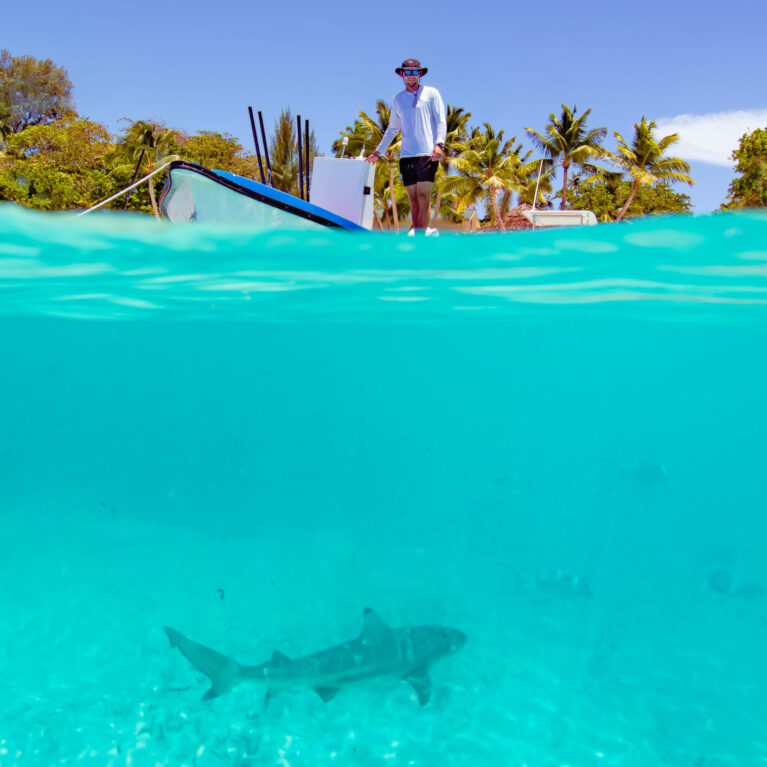The right reefs for sharks
Nico is using acoustic telemetry and BRUVs around Seychelles to explore how reef sharks are using their reef homes. What are they eating? What prey is available? His project aims to explore what factors influence ideal habitats for sharks and will combine information from both pristine and degraded reefs to create a model to test this suitability. The point? To build on work by the Marine Futures Lab across the Indian Ocean and the Indo-Pacific and to help identify priority shark conservation areas.
Ever since I saw my first shark in 2013, I knew that I wanted to become a marine biologist and work with these fascinating animals one day. I grew up in Germany, some three hours’ drive from the nearest ocean, but discovered my passion for marine life at the age of 11 when I dived for the first time with my dad. That was in the Red Sea, in Egypt, and I remember being blown away by the colours and the number of fish we encountered – unlike anything I’d ever seen before. On finishing school, I flew to Seychelles...
Developing an understanding of behavioural patterns in marine top predators - how does coral reef habitat complexity affect the distribution and habitat use of reef sharks?
To investigate the relationship between reef habitat complexity and habitat use in different species of reef shark. By combining benthic habitat zonation and structural complexity metrics, prey availability surveys, and acoustic tracking and video observations of reef sharks, we will assess how changes to reef structure, and associated changes in reef fish communities, can affect the fine-scale habitat suitability choices of top coral reef predators.
Over the past decades, increases in shark fishing and climatic disturbance events have led to a global, cumulative decline in populations of coastal sharks and their associated habitat, coral reefs. A global study of coastal shark habitats found that sharks were absent from 20% of the 371 reefs surveyed. Indian Ocean areas were not only highlighted as being in critical need of protection, but also identified as having great potential for the implementation of predator-based management approaches.
This project will use cutting-edge technology and state-of-the-art ecological modelling to improve our understanding of the complex behaviour of reef sharks and inform regional management strategies. Identifying critical habitat for reef shark species in a near-pristine environment will help us to inform the effective management and protection of shark species in Seychelles’ waters. In addition, filling the knowledge gaps in functional predator ecology will aid in the effective management of these species and enable healthy reef environments to be safeguarded. By using a high-tech and low-cost approach, we will maximise the possibilities of replicating the study and the accessibility of digital approaches, both of which can assist long-term monitoring projects, predator studies and ecological modelling efforts.
The concept of top-down control in coral reef communities as well as trophic cascades induced by declines in shark populations have long been studied. Our understanding of these processes is complicated by the dynamic and complex nature of coral reef communities and much of what is known of these phenomena stems from field-based studies and associated food web modelling approaches. The drivers of non-trophic effects on reef communities are, however, often excluded from such investigations. In many cases, physical characteristics such as wave energy, current velocity and habitat dynamics are likely to impact foraging behaviour and success, for example. Habitat structure and complexity impact the distribution and availability of prey resources and are important components in interpreting inter-species interactions. Defining fine-scale habitat use patterns and environmental requirements as well as inter-species variations in reef dependence is crucial to understanding the role of sharks on reefs and predicting the consequences of their loss. Taking a bottom-up approach to modelling reef shark habitat interactions will give novel insights into the sharks’ complex behaviour patterns and the role benthic communities play in predator–prey interactions.
- To elucidate which biological, ecological and physical drivers influence reef shark distribution and habitat use across scales of varying complexity and exposure.
- To investigate predator–habitat dynamics by using a combination of acoustic tracking, BRUVS, dietary composition, prey species distribution and fine-scale habitat complexity assessments.
- To create a habitat suitability model, combining information from not only remote and near-pristine reefs, but also heavily degraded reefs close to human settlements. Model transferability will be maximised, thus enabling us to model the various drivers that influence how sharks use their habitat across scales.
- To assist in identifying priority areas for the conservation of reef sharks and in implementing predator-based management strategies. This work around Seychelles will build on previous studies conducted by the Marine Futures Lab across the Indian Ocean and the Indo-Pacific.
- To maximise knowledge exchange and dissemination by conducting in-country workshops with our collaborators to provide training in our survey methodologies, including assessing benthic community composition and complexity by means of three-dimensional SfM photogrammetry modelling and analysing prey using faecal DNA (fDNA) cloacal swabs.


